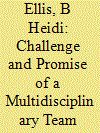|
|
|
Sort Order |
|
|
|
Items / Page
|
|
|
|
|
|
|
| Srl | Item |
| 1 |
ID:
188080


|
|
|
|
|
| Summary/Abstract |
Violent radicalization is a complex process that results from multiple influences and experiences across the settings and contexts of an individual’s life. No single pathway or characteristic determines who is at risk for it. Given this understanding, no single intervention aimed at this multiply-determined problem is likely to be successful if it is implemented in isolation. Multidisciplinary team approaches are increasingly seen as holding promise in the prevention and intervention of violent radicalization in the United States and internationally. A multidisciplinary team is typically a group of professionals who are members of different fields of study (psychology, medicine, social work, etc.) who provide a specific service to an individual. Team members independently focus on the issues in which they specialize and activities of the team are coordinated with a common goal. This paper aims to extend current knowledge by addressing questions related to challenges in implementing a multidisciplinary team approach with the capacity to address violent radicalization, presenting potential solutions to these challenges as well as highlighting one multidisciplinary team, Community Connect, that successfully worked with youth identified as being at risk for violence.
|
|
|
|
|
|
|
|
|
|
|
|
|
|
|
|
| 2 |
ID:
142527


|
|
|
|
|
| Summary/Abstract |
This article examines key setting events and personal factors that are associated with support for either non-violent activism or violent activism among Somali refugee young adults in the United States. Specifically, this article examines the associations of trauma, stress, symptoms of posttraumatic stress disorder (PTSD), posttraumatic growth (PTG), strength of social bonds, and attitudes towards legal and non-violent vs. illegal and violent activism. Structured interviews were conducted with a sample of Somali refugee males ages 18–25 living in the northeastern United States (N = 79). Data were analyzed using multiple linear regressions and path analysis. Greater exposure to personal trauma was associated with greater openness to illegal and violent activism. PTSD symptoms mediated this association. Strong social bonds to both community and society moderated this association, with trauma being more strongly associated with openness to illegal and violent activism among those who reported weaker social bonds. Greater exposure to trauma, PTG, and stronger social bonds were all associated with greater openness to legal non-violent activism.
|
|
|
|
|
|
|
|
|
|
|
|
|
|
|
|
| 3 |
ID:
181745


|
|
|
|
|
| Summary/Abstract |
In this study we examine how grievances and social connection among Somali immigrants are associated with attitudes towards radicalization to violence. Data was drawn from structured interviews with 213 Somali young adult men living in North America. Structural Equation Modeling was used to test the association of grievances with attitudes in support of political violence, and the mediating role of social connection (ethnic community belonging, attachment to nation of residence, and social comfort seeking online). Both grievances and social connection/disconnection relate to support for political violence, but in complex ways. Findings are discussed in relation to prevention of violent extremism.
|
|
|
|
|
|
|
|
|
|
|
|
|
|
|
|
|
|
|
|
|